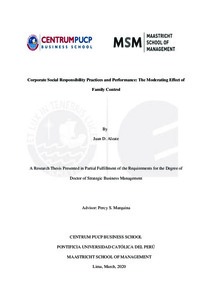| dc.contributor.advisor | Marquina Feldman, Percy Samoel | |
| dc.contributor.author | Alzate Gómez, Juan Diego | |
| dc.date.accessioned | 2020-05-14T20:32:34Z | |
| dc.date.available | 2020-05-14T20:32:34Z | |
| dc.date.created | 2020-03 | |
| dc.date.issued | 2020-05-14 | |
| dc.identifier.uri | http://hdl.handle.net/20.500.12404/16193 | |
| dc.description.abstract | Companies face pressures of legitimacy and social acceptance in the markets where
they operate (Yang, Su, & Fam, 2012). These pressures are accentuated by new trends in
sustainable development (Bonsón & Bednárová, 2015; Caravedo, 2011; Vives & Peinado-
Vara, 2011). In this sense, corporate social responsibility (CSR) has become a valuable tool
for companies in their search for legitimacy and recognition on the part of society.
Understanding the relationship between CSR and economic performance enables
companies to adopt practices based on complementarity between economic, social and
environmental aspects that help improve their interests together with those of their
stakeholders (Valenzuela, Jara-Bertin, & Villegas, 2015). In contexts characterized by a high
degree of ownership concentration, such as the Colombian case, understanding this
relationship can help family businesses increase their legitimacy and economic performance
(Lindgreen, Swaen, & Johnston, 2009).
The purpose of this descriptive-quantitative study was twofold. On the one hand, it
seeks to determine the relationship between the implementation of CSR practices and
economic performance. On the other, it seeks to identify the effect of family control on the
CSR-Performance relationship. For this, we studied a sample of 55 companies listed on the
stock exchange of Colombia during the period 2010-2017. The analysis was performed with
multiple regression models estimated from the GMM method. Three findings are highlighted:
(a) No evidence was found about a relationship between the family character and the
adoption of CSR practices; (b) Evidence was found on a direct relationship between the
adoption of CSR practices and economic performance; and (c) the family character does not
influence the CSR-Performance relationship. | es_ES |
| dc.description.abstract | Las empresas enfrentan presiones de legitimidad y aceptación social en los mercados donde
operan (Yang et al., 2012). Estas presiones se acentúan por las nuevas tendencias en el
desarrollo sostenible (Bonsón & Bednárová, 2015; Caravedo, 2011; Vives & Peinado-Vara,
2011). En este sentido, la responsabilidad social corporativa (RSC) se ha convertido en una
herramienta valiosa para las empresas en su búsqueda de legitimidad y reconocimiento por
parte de la sociedad.
Comprender la relación entre la RSC y el desempeño económico permite a las empresas
adoptar prácticas basadas en la complementariedad entre aspectos económicos, sociales y
ambientales que ayuden a mejorar sus intereses junto con los de sus grupos de interés
(Valenzuela et al., 2015). En contextos caracterizados por un alto grado de concentración de
la propiedad, como el caso colombiano, comprender esta relación puede ayudar a las
empresas familiares a aumentar su legitimidad y desempeño económico (Lindgreen et al.,
2009).
El propósito de este estudio descriptivo-cuantitativo fue doble. Por un lado, busca determinar
la relación entre la implementación de prácticas de RSC y el desempeño económico. Por otro
lado, busca identificar el efecto del control familiar en la relación RSC-Desempeño. Para ello,
estudiamos una muestra de 55 empresas que cotizan en la bolsa de valores de Colombia
durante el período 2010-2017. El análisis se realizó con modelos de regresión múltiple
estimados a partir del método GMM. Se destacan tres hallazgos: (a) No se encontró evidencia
sobre una relación entre el carácter familiar y la adopción de prácticas de RSC; (b) Se
encontró evidencia sobre una relación directa entre la adopción de prácticas de RSC y el
desempeño económico; y (c) el carácter familiar no influye en la relación RSC-Desempeño. | es_ES |
| dc.language.iso | eng | es_ES |
| dc.publisher | Pontificia Universidad Católica del Perú | es_ES |
| dc.rights | info:eu-repo/semantics/openAccess | es_ES |
| dc.rights.uri | http://creativecommons.org/licenses/by-nc-nd/2.5/pe/ | * |
| dc.subject | Desempeño económico | es_ES |
| dc.subject | Empresa familiar | es_ES |
| dc.subject | Responsabilidad social corporativa | es_ES |
| dc.title | Corporate social responsibility practices and performance: the moderating effect of family control | es_ES |
| dc.type | info:eu-repo/semantics/doctoralThesis | es_ES |
| thesis.degree.name | Doctor en Administración Estratégica de Empresas | es_ES |
| thesis.degree.level | Doctorado | es_ES |
| thesis.degree.grantor | Pontificia Universidad Católica del Perú. CENTRUM | es_ES |
| thesis.degree.discipline | Administración Estratégica de Empresas | es_ES |
| renati.advisor.dni | 07569603 | |
| renati.advisor.orcid | https://orcid.org/0000-0003-1541-572X | es_ES |
| renati.discipline | 413038 | es_ES |
| renati.level | https://purl.org/pe-repo/renati/level#doctor | es_ES |
| renati.type | http://purl.org/pe-repo/renati/type#tesis | es_ES |
| dc.publisher.country | PE | |
| dc.subject.ocde | https://purl.org/pe-repo/ocde/ford#5.02.04 | es_ES |






